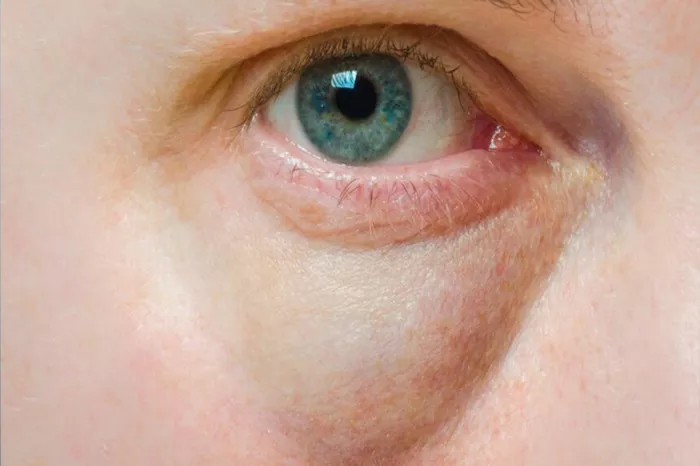Bags under the eyes can make you look older and more tired than you feel. They can affect anyone, at any age, and are influenced by various factors, including sleep. Let’s delve into the details of how sleep impacts these under-eye bags and explore other factors that might help in reducing them.
What Causes Bags Under the Eyes?
Bags under the eyes are primarily caused by the weakening of tissues and muscles supporting the eyelids. Here’s a detailed breakdown of the contributing factors:
Aging
As we age, our skin loses its elasticity. The fat that supports the eyes can then migrate forward into the lower eyelids, making them look puffy. Aging can also cause fluid to accumulate in the area below your eyes, adding to the swelling.
Sleep Deprivation
Lack of sleep can cause the blood vessels under the eyes to dilate, leading to dark circles and puffiness. Sleep is crucial in helping the body repair itself, and without adequate rest, the skin can suffer, making the bags under the eyes more pronounced.
Fluid Retention
Excessive salt intake can cause the body to retain fluid, which may contribute to puffy eyes. Similarly, lying flat while sleeping can also cause fluids to accumulate in the area around the eyes.
Allergies
Allergies can cause the eyes to become red and swollen. Rubbing or scratching the area can further irritate the skin and contribute to puffiness.
Genetics
Genetics can play a significant role in the appearance of bags under the eyes. If your parents or close relatives have puffy eyes, you may be more likely to develop them.
Can Sleep Get Rid of Bags Under the Eyes?
Sleep plays a vital role in reducing the appearance of bags under the eyes, but it is not the only factor. Here’s how sleep affects your eye health:
Restorative Properties of Sleep
During sleep, your body undergoes repair and restoration. This includes repairing skin cells and improving blood flow, which can reduce puffiness and dark circles.
Sleep Position
Sleeping on your back can prevent gravity from causing fluids to pool under your eyes, reducing the risk of puffiness. Additionally, using an extra pillow to elevate your head slightly can further minimize fluid accumulation.
Quality of Sleep
The quality of your sleep is as important as the quantity. Ensure you have a regular sleep schedule and a comfortable sleeping environment to help reduce stress and inflammation, which can contribute to bags under the eyes.
See also: Best Non Invasive Treatment For Eye Bags
Other Effective Remedies for Under-Eye Bags
While sleep is a crucial factor in reducing eye bags, several other remedies can also be effective:
Cold Compress
Applying a cold compress to your eyes can help reduce swelling. The cold constricts the blood vessels, which reduces fluid accumulation and puffiness.
Hydration and Diet
Staying well-hydrated helps prevent water retention, which can cause puffiness. Reducing salt intake and eating foods rich in potassium, such as bananas and yogurt, can also help maintain a healthy fluid balance.
Topical Treatments
Caffeine-based eye creams can help reduce under-eye puffiness. Caffeine constricts blood vessels and may temporarily reduce swelling and dark circles.
Allergy Treatments
If your eye bags are due to allergies, addressing the root cause is crucial. Over-the-counter or prescription allergy medications can help reduce symptoms.
Cosmetic Procedures
For persistent under-eye bags, cosmetic treatments like fillers or surgery may be an option. Fillers can help smooth out the area under the eyes, while blepharoplasty (eyelid surgery) can remove excess fat and skin.
Lifestyle Changes for Long-Term Improvement
Making specific lifestyle changes can also help reduce the appearance of bags under the eyes:
Regular Exercise
Exercise improves blood circulation and can help reduce water retention and inflammation, which may contribute to puffiness.
Avoid Smoking and Alcohol
Smoking and excessive alcohol consumption can exacerbate the appearance of under-eye bags by dehydrating the skin and damaging blood vessels.
Manage Stress
Chronic stress can affect your sleep and overall health, leading to puffiness and dark circles. Techniques such as meditation, yoga, or deep breathing exercises can help manage stress levels.
When to See a Doctor
While bags under the eyes are typically a cosmetic concern, they can sometimes indicate a more severe condition. Consult a doctor if you experience any of the following:
Persistent Swelling
If the swelling persists despite lifestyle changes and home remedies, it may indicate an underlying health issue that requires medical attention.
Pain or Discomfort
Any pain, redness, or discomfort around the eyes should be evaluated by a healthcare professional to rule out infections or other conditions.
Vision Changes
If you notice changes in your vision or experience double vision, seek immediate medical attention.
Conclusion
While sleep plays a significant role in reducing the appearance of bags under the eyes, it’s not the only solution. A combination of proper sleep, hydration, diet, and lifestyle changes can significantly improve the appearance of under-eye bags. However, if these measures do not help, consider consulting a healthcare professional for further evaluation and treatment options.
Related topic:
How to Get Rid of Eye Bags with Spoons?
Will Losing Weight Reduce Eye Bags?
Why Do I Have Bags Under My Eyes?

